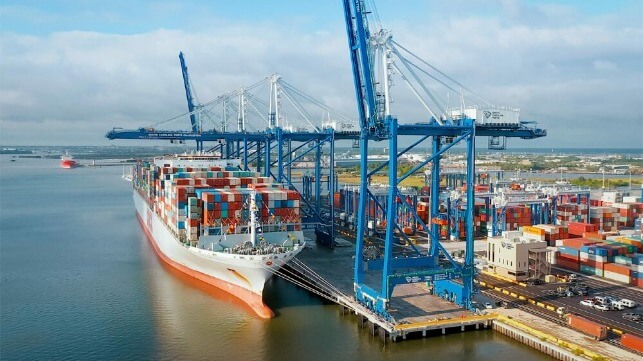Charleston and ILA Strike Landmark Agreement for Container Operations

South Carolina Ports, the government agency that oversees the operations of the state’s ports, and the International Longshoremen’s Association reached a historic agreement to create a shared workforce after years of legal battles. Charleston’s billion-dollar new container terminal had been largely idle due to the dispute while the settlement also creates a glimmer of hope for the master contract due to expire September 30 for ports from Maine to the Gulf Coast.
South Carolina invested in the future of its container operations with the massive Hugh K. Leatherman Terminal which was completed early in 2021 only to find itself in a drawn-out legal battle over staffing. For more than 50 years, SC Ports used what was called a hybrid model for its workforce which separated duties and had port employees, not union members, operating cranes and heavy-lift equipment. Despite a 2012 revision to the contract calling for future ports to be entirely union-staffed, SC Ports attempted to follow the hybrid model when opening the new Leatherman Terminal.
The state’s Governor Henry McMaster had vowed to fight the union at every step after the dispute started in 2021. It went through a series of courts and was finally rejected by the U.S. Supreme Court clearing the way for the ILA to staff Leatherman. SC Ports and the ILA quietly began talks stretching over most of 2024 to resolve the dispute and clear the way for Leatherman to reach its full capacity.
“SC Ports and ILA proudly announce that after productive and collaborative conversations, we have mutually developed and agreed to the framework for an operating agreement that will create long-term stability and competitiveness for the Port of Charleston while providing an enhanced product,” the ILA and SC Ports said in a joint statement released on June 25. “SC Ports and ILA are ready to welcome our USMX partners at the Leatherman Terminal for many years to come without hesitation as all obstacles to operations have been removed.”
The Post and Courier newspaper in Charleston reports the framework calls for the end of the separation of staff assignments under the old hybrid model. Crane and equipment operators are now free to join the union or remain part of the SC Ports workforce and both will staff the operations of the equipment. While the court decision had only impacted Leatherman, the agreement also includes the older Wando Welch Terminal as well as the smaller North Charleston Terminal, with the new shared model to be applied at all three container facilities.
Port officials told the Port and Courier that details still needed to be worked out to implement the framework agreement. They however confident that it can move forward quickly. Port officials are billing the agreement as the "reopening" of the Hugh K. Leatherman Terminal.
The major carriers, represented by the U.S. Maritime Alliance (USMX) had refused to transfer their operations to the Leatherman Terminal due to the dispute. The state had invested heavily in the construction of the new terminal which in its first phase was to add annual capacity for 700,000 TEU. The completed terminal will have three berths and a total annual capacity of 2.4 million TEU, which approximately doubles the capacity of the Welch terminal.
The opening of the terminal will facilitate the expansion of the operations in Charleston and also relieve pressure on the historic terminal. Recently, SC Ports attempted to close a portion of the berth at the Welch terminal for repairs to the seawall and it resulted in congestion. The port just announced it would suspend the construction project to reduce the containership backlog.
The newspaper report highlights that Savannah becomes ecame the last major port in the U.S. to employ the hybrid model where union employees move boxes on the ground while port employees run the cranes and equipment. Having won the new agreement in Charleston, the ILA looks to also end the model in Savannah as the Georgia Ports Authority is planning a new terminal and expansion of its container operations.

that matters most
Get the latest maritime news delivered to your inbox daily.
There however are growing fears of a crippling strike for the U.S. East Coast ports for October as the ILA recently said it would not resume talks due to local disputes over port automation. USMX and the ILA were due to begin talks this month to resolve the master contract for dockworkers. Despite having reached agreements on new contracts without a strike for years, the union has repeatedly said it will not go past the September 30 deadline.
